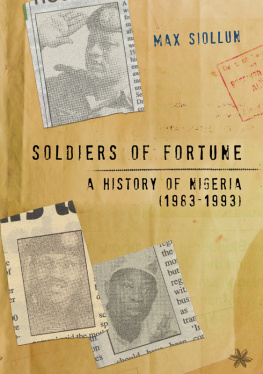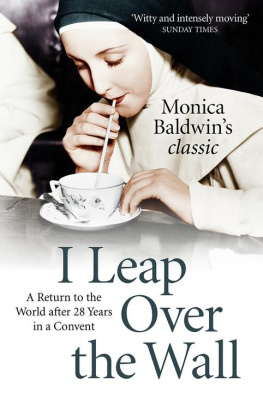
Cassava Republic Press Book
First published in Nigeria by Cassava Republic Press 2013
Copyright 2013 Max Siollun
All rights reserved.
No part of this publication may be reproduced, stored in a retrieval system, or transmitted, in any form or by any means, electronic, mechanical, photocopying, recording or otherwise, without the prior written permission of the publisher.
A CIP catalogue record for this book is available from the Nigerian National Library
ISBN: 978-978-944-449-6
Cover by Lynn Hatzius
Typeset by Amina Gimba
Cassava Republic Press
62B, Arts and Crafts Village
Opposite Sheraton, Abuja, Nigeria
www.cassavarepublic.biz
The legacy of heroes is the honour of a great name and the inheritance of a great example.
This book is written for, and is dedicated to the memory of my father - a man who lived and died in service of his country.
-Max Siollun
CONTENTS
PREFACE
Nigerian Military Rule in Perspective
Nigeria is a country of great diversity and contradiction. A country with over 150 million people spread across over 250 different ethnic groups, half of them Christian, half of them Muslim. It has world class wealth, yet is full of poor people. Christians live in the supposedly Muslim north; Muslims live in the supposedly Christian south, and some ethnic groups (like the Yoruba) practice both Christianity and Islam. Yet through all the contradiction, diversity and linguistic confusion, there has been one constant in Nigerian life: military interference in politics.
In 2010 Nigeria celebrated 50 years as an independent nation. As it passed this milestone there is renewed interest in its history. Although modern Nigeria cannot be understood without reference to its era of military rule, there is little objective literature on the fifteen years of military rule (1984 1999) that preceded the current civilian government. The small body of literature on the era of military rule consists largely of hagiographic biographies by, or about, some of the key personalities of the era.
The second period of military rule between 1984 and 1993 crafted modern Nigerian society, and effected cataclysmic changes in Nigerias political, economic and religious character that nearly tore the country apart on several occasions. There is need for stock taking and objective analysis of the mistakes of the past. The story of Nigerian military rule is an untapped vault for the non-academic audience, with few scholars devoting serious effort to accurately recording it. Little is known of Nigerian military political history due to an almost Mafia-like code of silence by its leading figures. The result has been public discourse dominated by JFK-esque conspiracy theories, rumour and innuendo. Official sources have been reluctant to divulge details of Nigerias recent past largely because most of the key dramatis personnae are still alive, and to avoid inflaming passions in an already volatile country.
Powerful personalities behind Nigerias military governments are still active and influential in political positions, even if they have removed their uniforms and transformed themselves into civilian rulers. David Mark (current Senate President and the third most powerful person in Nigerias political hierarchy) is a retired army brigadier. His former military colleagues include active politicians such as Governors Murtala Nyako, Olabode George (both retired navy officers), and Jonah Jang (a retired air force officer).
The retired military even constitute the most significant opposition figures. The leading member of the opposition to the ruling Peoples Democratic Party is former military head of state Major-General Muhammadu Buhari. Even some of the most powerful traditional rulers in Nigeria are former military officers. The current Sultan of Sokoto, Amir-ul Mumineen There are very few Emirs without sons or nephews in the military. This continues a long tradition of blue bloods in the military first pioneered by Major-General Hassan Katsina, the late Chief of Army Staff and son of the former Emir of Katsina, Usman Nagogo. Major-General Shehu Musa YarAdua, older brother of Nigerias former President Umaru YarAdua, was also of aristocratic origin. His father Mallam Musa YarAdua was the Mutawallen Katsina (custodian of treasury of the Katsina Emirate Council).
After gaining independence from the United Kingdom in 1960, Nigerias parliamentary Westminster-style democracy collapsed on January 15, 1966, when a group of radical young army majors staged a military coup and overthrew the civilian government of Prime Minister Abubakar Tafawa Balewa. Although the coup leaders did not manage to seize power for themselves, the coups violent nature, and assassination of key government personnel such as Prime Minister Balewa, Alhaji Sir Ahmadu Bello (Premier of the Northern Region), Samuel Akintola (Premier of the Western Region), and Festus Okotie-Eboh (Finance Minister) was enough to topple the government and persuade the rump cabinet to cede power to the General Officer Commanding (GOC) the army, Major-General Johnson Aguiyi-Ironsi.
Although Ironsi had suppressed the coup and was not among its planners, he was unable to escape the stigma attached to it. Northern soldiers were aggrieved at the coups lopsided nature and became suspicious of it, and of Ironsis motives. Since most of the coups planners were Igbo, their victims were non-Igbo, and its outcome was a military government led by an Igbo army officer, northerners suspected that the coup was an orchestrated conspiracy to wrest power away from the northern-led civilian government. These tensions and suspicions led to another coup by northern officers in July 1966, during which Ironsi was assassinated and replaced by Lt-Colonel Yakubu Gowon. Gowon governed until July 1975 when he was deposed by the same soldiers who had staged the coup that brought him to power in the July 1966 Coup.
The new military leader was Brigadier Murtala Muhammed, the leader of the July 1966 coup. After Muhammed was assassinated during an abortive attempted coup in February 1976, he was replaced by his deputy, Lt-General Olusegun Obasanjo. Obasanjo remained in power for almost four years, leading the country back to civilian democracy before stepping down in October 1979 after multi-party elections were won by Alhaji Shehu Shagari of the National Party of Nigeria (NPN). The voluntary surrender of power was a source of great pride and prestige to the military, but it amplified its political ambitions by giving it a self-righteous air of being the nations political custodian and moral conscience.
The transfers of power from one military regime to another were not random. Each coup and government had substantial continuity of personnel. The same people have controlled Nigerian political and military life since 1966. The group of officers that brought Gowon to power in August 1966 formed the foundation of all succeeding military regimes until 1998. Although leadership of the regimes changed, the personalities behind the coups and regimes did not. The 1966 cadre created successive dynastic military regimes for the next 32 years. The young non-commissioned officers (NCOs) and lieutenants who blasted Major-General Aguiyi-Ironsi from power in 1966 became the colonels who ousted his successor General Gowon in 1975, and they became the Brigadiers and Major-generals who overthrew President Shagari in 1983. These officers included Ibrahim Babangida, Sani Abacha, Muhammadu Buhari, Shehu Musa YarAdua, Aliyu Mohammed, Joshua Dogonyaro, Jerry Useni and Ibrahim Bako.
Between 1966 and 1979, Nigerian military regimes ruled with a deft touch, and rarely resorted to ruthless force. Apart from being unelected, they behaved little differently from the civilians they replaced. Most regimes during this era would probably have defeated their predecessor civilian government in an election and were generally more popular than civilian governments. The military was perceived to be an agent of order and stability, in contrast to the institutional chaos that accompanied civilian politicians. The military governed with popular appeal and little opposition. To Nigerians, military rule was an attractive alternative to civilian governance. Each military government was welcomed with jubilation and great optimism. The incoming government would then reciprocate that optimism with grandiose promises of reform and an end to the ills of its predecessor.
Next page










